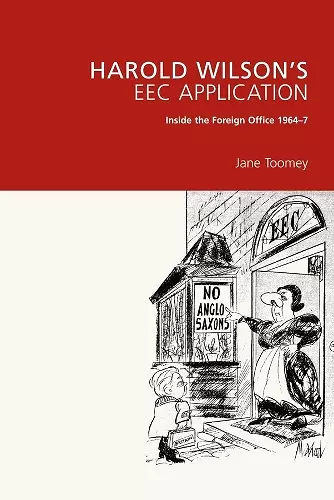Harold Wilson's EEC Application
Inside the Foreign Office 1964-7
Format:Hardback
Publisher:University College Dublin Press
Published:29th Oct '07
Currently unavailable, and unfortunately no date known when it will be back

Britain's policy towards Europe in the latter half of the twentieth century has been the subject of endless interest, scrutiny and debate. The European question has dominated foreign policy agendas from Churchill to Blair. This book seeks to further our knowledge of one of the most crucial periods for both Britain and Europe but also to enliven the debate concerning fundamental issues. Why, against a backdrop of the burgeoning 1960s, did the Labour Prime Minister, Harold Wilson, seek to replicate the path taken by his Conservative predecessor Harold Macmillan, and make an application to join the EEC? And why was he unable to succeed? These two questions are central to this study and their answers provide invaluable insights into the formulation, execution and fate of Britain's European policy during this period. Using newly released archival material in the National Archives and having consulted extensive interviews with many of the key political figures, Jane Toomey not only challenges old assumptions but also offers a new interpretation of Wilson's European diplomacy.
"Toomey (a Government of Ireland Postdoctoral Fellow at the Humanities Institute of Ireland) examines the dynamics between the British Foreign Office and Prime Minister Harold Wilson's Labour cabinet of 1964-67 concerning the decision to re-apply to the European Economic Community. [S]he argues that Wilson's government applied to join the EEC only after all alternatives to the European path had been explored and found wanting and that political motives outweighed economic considerations A... [S]he also absolves Wilson and his colleagues of blame for the failure of the application, placing all responsibility on France's Charles de Gaulle." Reference and Research Book News August 2008 "Jane Toomey's is the second recent monograph devoted to this frustrating chapter in British post-war European policy. It approaches its task in jaunty fashion, sprinkling each chapter with an abundance of direct quotations, drawn as often from recent interviews and correspondence with ageing politicians and civil servants as from the archival documents which more normally predominate in studies of official policy - [She] also makes rather better use than some other historians of both the contemporary press and public speeches made on the European theme by British politicians whether in government or opposition. Again this has the effect of lightening the tone of the account - The author has clearly done enough research to have contributed some useful new views on an interesting, if ill-fated, episode in British foreign policy-making." English Historical Review April 2009
ISBN: 9781904558699
Dimensions: unknown
Weight: unknown
160 pages